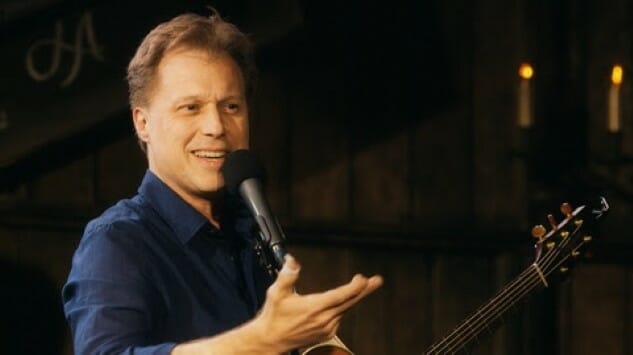Henry Phillips: The Comedian Who Makes Cringe an Art Form

There’s a very specific, very peculiar sensation one feels when queuing up a Henry Phillips video on YouTube, if you know what to expect. Here’s a man, standing in front of you in a poorly lit kitchen, with a sappily optimistic-looking expression on his face, but unmistakable fear bubbling up just under the surface. He’s going to try and cook something for you. And it’s not going to go well. What you feel, then, is anticipation and preemptive pity—the expectation of humor, but a simultaneous quickening of the pulse, because you know you’re about to witness something that is truly, uncomfortably, painfully awkward. That’s Henry Phillips’ wheelhouse.
The pain truly is the most important part, and it’s his commitment to uncomfortableness that separates Phillips from other self-deprecating comedians. Henry would never dream of stopping at simple self-deprecation—he’s not the subject of his jokes so much as the victim of them. His stand-up comedy and multiple web series, of which “Henry’s Kitchen” is the most notable, revolve entirely around punishing the characters he plays with awkwardness and resulting depression that go far beyond what a normal human being would be able to withstand. If you’re able to watch his videos without thinking “oh god, this is going to be bad,” then he’s off his game.
Phillips is a comedian who has been most visible in the last few years, but the roots of his performances stretch back to when he was a sincere singer-songwriter in the ‘80s and ‘90s. By the late ‘90s, however, a certain jadedness with the entertainment industry transformed Phillips’ act into one blending music with stand-up, singing satirical songs that parodied the singer-songwriters and folk musicians he once identified with.
“I feel like that’s when I struck a chord with the frustration people feel,” said Phillips on the phone, in advance of the release of his new album Neither Here Nor There on Friday, Aug. 19. “Most of what I’ve been doing is trying to express failure, human failure, and laugh at it. That’s where my music act came from; I thought ‘Wouldn’t it be funny if one of these super sincere singers was up there, just giving way too much personal information away every night?’”
The comedian’s material works across multiple formats, whether he’s singing or telling more traditional jokes on stage, or appearing in bizarre YouTube playlets. They all contain the same quintessential “Henry” character that Phillips has carved out for himself, a man who is desperate for the barest affection or affirmation, but is the constant victim of both terrible luck and his own inability to read people and connect with them in a normal way. Both aspects of failure are captured wonderfully in his other web series, “You and Your Fucking Coffee,” a sequence of shorts where Henry simply plays himself, perpetually searching for the seemingly simple request of a cup of coffee while actively ruining the lives of anyone around him unlucky enough to be drawn into the vortex of despair.
-

-

-

-

-

-

-

-

-

-

-

-

-

-

-

-

-

-

-

-

-

-

-

-

-

-

-

-

-

-

-

-

-

-

-

-

-

-

-

-








































